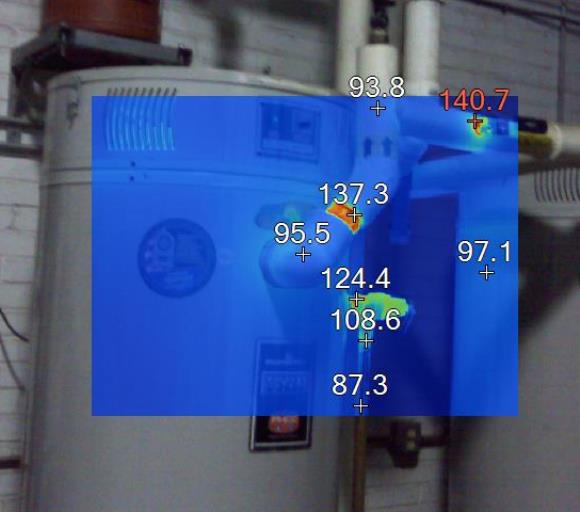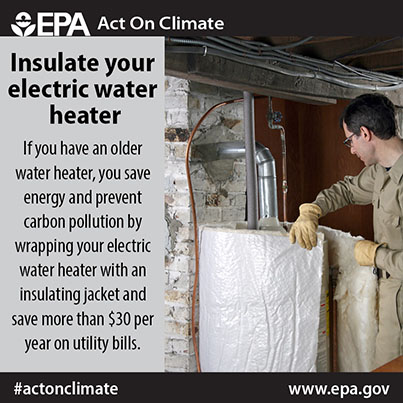 So there you are walking through your favorite home improvement store and there is an insulation blanket or kit for water heaters. Hmm, does that really work? Maybe you pull your smartphone out & it brings you to a piece like this one from EPA’s Earth Month where it states “Improve your water heater’s insulation by wrapping it with an insulating jacket and save more than $30 per year while preventing carbon pollution.” Well shoot the cost even with taxes means it pays for itself within the first year, so…
So there you are walking through your favorite home improvement store and there is an insulation blanket or kit for water heaters. Hmm, does that really work? Maybe you pull your smartphone out & it brings you to a piece like this one from EPA’s Earth Month where it states “Improve your water heater’s insulation by wrapping it with an insulating jacket and save more than $30 per year while preventing carbon pollution.” Well shoot the cost even with taxes means it pays for itself within the first year, so…
Should I insulate my Water Heater?
In short the answer is easy – no. In fact if you look at the picture below (that was on the EPA’s page) you can see that it states “if you have an older water heater.” Hmmm does older mean one year, three years, five years and why not new ones? In this case older means at least 10+ years old (opinions vary but most say 2000 – 2004) based on how they used to be made & insulated.

As for why not newer units, well the first issue is that the manufacturers will not warranty them or cover any issues as seen on this pdf from American Water Heater. The second & dare I say biggest issues I have seen falls under individuals covering access panels & or using an electric version on a gas heater & blocking the air flow required resulting in fires.
 Don’t know the age or the specs – well you can always pull it up using the AHRI directory. With that, if you place your hand on the side & it feels hotter than the wall, it is an older one & you might get some benefit from wrapping it. If it feels the same temperature then it is a newer one & adding insulation will not help. Don’t know the age or the specs – well you can always pull it up using the AHRI directory. With that, if you place your hand on the side & it feels hotter than the wall, it is an older one & you might get some benefit from wrapping it. If it feels the same temperature then it is a newer one & adding insulation will not help. |
What happens if I have a 10+ year old water heater?
Well let me congratulate you on having one that lasted that long & then strongly suggest you get a new more efficient unit before yours dies or springs a major leak probably at the most inopportune moment. Beyond that & if you do feel lucky – purchasing the blanket designed for your system & installing it properly can help you in some regards though actually getting $30 worth of savings a year is stretching it in many cases based on where it is located & use.
 Want to improve your water heaters performance? Make sure you maintain it properly: Basic Water Heater Maintenance – Draining the tank. We generally recommend you do this along with checking or replacing the anode rods in July. Fore more money saving tips & tricks we have quite a few articles out there including this one that has a tip for new standard electric water heaters. Want to improve your water heaters performance? Make sure you maintain it properly: Basic Water Heater Maintenance – Draining the tank. We generally recommend you do this along with checking or replacing the anode rods in July. Fore more money saving tips & tricks we have quite a few articles out there including this one that has a tip for new standard electric water heaters. |

Love that the EPA flyer has a picture of a gas DHW (with poor slope on the venting), but the writing refers to an electric DHW.
LOL, thanks Jeffrey I can’t believe I missed that obvious one (gas vrs electric). Thanks for chiming in & I hope business is going good for you guys
Love that the EPA flyer has a picture of a gas DHW (with poor slope on the venting), but the writing refers to an electric DHW.
LOL, thanks Jeffrey I can’t believe I missed that obvious one (gas vrs electric). Thanks for chiming in & I hope business is going good for you guys
Love that the EPA flyer has a picture of a gas DHW (with poor slope on the venting), but the writing refers to an electric DHW.
I am guessing that my electric water heater may be around 35 years old. It works just fine, but I’m thinking I might need to replace it, before it fails. Any suggestions on at least 50 gallon units.
Loaded question – first, I am assuming you want to stay with electric? One of the big questions is exactly how much room do you have. Even a cheap new one might be larger than you have space for as I showed here: https://thehtrc.com/2019/wacky-weds-got-a-shoehorn-handy
Next question is how much do you use it? While not a fan of electric instant versions it can work out if hardly used. Personally I lean more towards Marathon with their extra insulation which does cut down on how often it might need to turn on just to keep the water hot. Heat Pump Water Heaters – probably not worth the money unless certain circumstances are met. With all that said, any newer model will be better than what you have now.
Best features – ceramic coated interior or glass tank. I think most now only have one element kick on to help keep it warm, whereas both will kick on for needing heat now.
FYI – make sure you check the breaker / fuse size that tells you how big of an element you can handle. Bigger element = quicker heating
Seeing you have time – do your research & get it ordered so you aren’t stuck with something you might not like as much & have to possibly pay more if it goes suddenly. Hope this helps & thanks for chiming in – let us know if we can help further